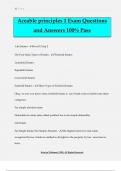Exam (elaborations)
Aceable principles 1 Exam Questions and Answers 100% Pass
Module
Aceable agent real estate
Institution
Aceable Agent Real Estate
Aceable principles 1 Exam Questions
and Answers 100% Pass
Life Estates - level 13 chp 2
The Four Main Types of Estates - Freehold Estates
Leasehold Estates
Equitable Estates
Concurrent Estates
Freehold Estates - Three Types of Freehold Estates
Okay, so now you know what a freehold estate is...
[Show more]
Preview 4 out of 81 pages
Uploaded on
December 27, 2024
Number of pages
81
Written in
2024/2025
Type
Exam (elaborations)
Contains
Questions & answers
Institution
Aceable agent real estate
Module
Aceable agent real estate
£11.29
Also available in package deal from £64.46
100% satisfaction guarantee
Immediately available after payment
Both online and in PDF
No strings attached
Also available in package deal (1)
Aceable Agent Real Estate Bundled Exams Questions and Answers 100% Pass | Get it at 40% Discount off!!
£ 140.05
£ 64.46
13 items
1. Exam (elaborations) - Aceable agent - principles of real estate ii exam notes questions and answers
2. Exam (elaborations) - Aceable agent - principles of real estate ii exam notes questions and answers
3. Exam (elaborations) - Ca real estate principles test aceable agent questions and answers
4. Exam (elaborations) - Ca aceableagent real estate principles questions and answers 100% pass
5. Exam (elaborations) - Aceable agent: real estate principles: review questions with correct answers
6. Exam (elaborations) - Aceable agent - level 1 - property ownership - chapters 1-4 questions and answers
7. Exam (elaborations) - Aceable agent: level 1 exam questions and answers
8. Exam (elaborations) - Aceable agent law of agency exam questions and answers 100% pass
9. Exam (elaborations) - Aceable law of agency review questions and answers
10. Exam (elaborations) - Aceable principles 1 exam questions and answers 100% pass
11. Exam (elaborations) - Aceable principles 1 combined, exams questions and answers 100% pass
12. Exam (elaborations) - Aceable exam practice questions and answers 100% pass
13. Exam (elaborations) - Principles of real estate 1 texas aceable questions and answers 100% pass
Show more
1|Page




